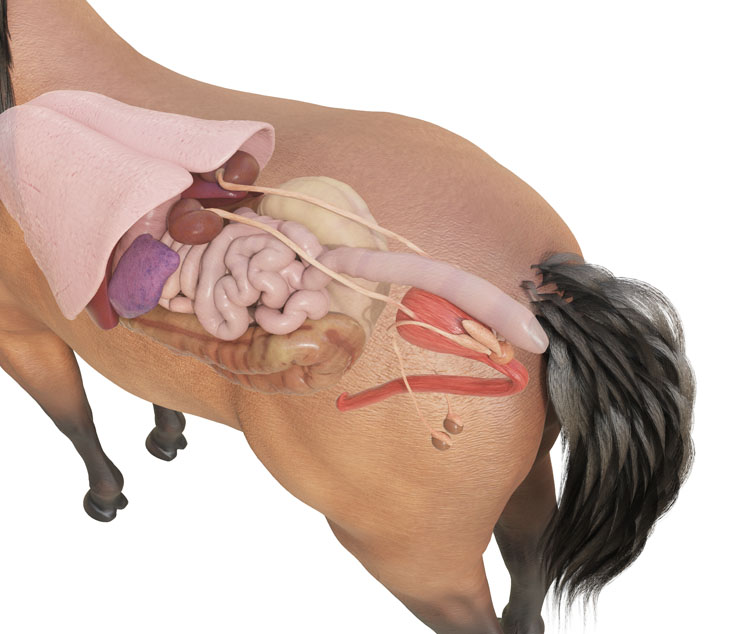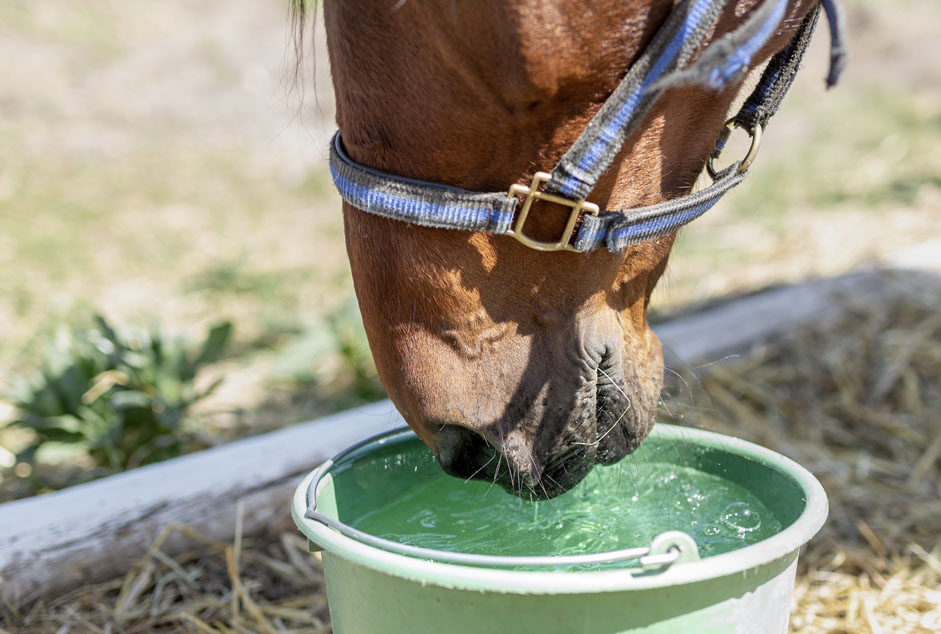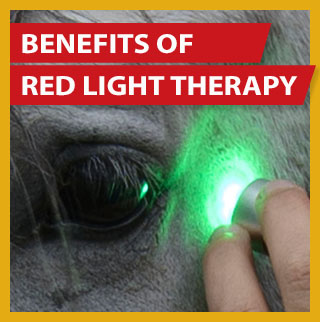
Natural Horse Health - for a Healthy Body & Mind
Natural horse health encompasses a holistic approach to equine well-being, emphasizing natural practices and methods to promote optimal health and prevent illness. Topics including feeding, supplements, natural horse remedies, herbs, alternative therapies, natural horse vets, horse vaccines and deworming.
Diet is the primary driver of health, in all mammals. If the body is not receiving the correct nutrients, in the form that it evolved to digest, then both physical and mental health is going to deteriorate. The saying, "If you put junk in, then you get junk out" could not be truer in this regard.
Feeding for Natural Horse Health
Horses, as natural grazers, thrive on a diet primarily
composed of forage. Understanding the importance of forage and its
various forms, along with the essential roles of water and salt, forms the
cornerstone of effective equine nutrition.
The Significance of Forage
A horse's digestive system is uniquely adapted for a constant flow of high-fiber forage. Straying from this natural feeding pattern can lead to a host of health problems. A forage-based diet offers multiple advantages:
- Reduced Risk of Gastric Ulcers: The horse's stomach continuously produces acid, even when empty. Forage acts as a buffer, protecting the stomach lining and reducing the risk of ulcers. Grain-based feeds, on the other hand, can increase acidity and contribute to ulcer development.
- Colic Prevention: Continuous foraging promotes a stable gut environment. Large, infrequent meals, especially those high in grain, can disrupt the balance of the hindgut microbiome, increase the risk of impaction, and lead to colic.
- Hormonal and Metabolic Health: Forage restriction can cause stress and trigger hormonal imbalances that can lead to obesity, insulin resistance, and laminitis. Diets high in grain can also cause rapid spikes in blood sugar and insulin, further increasing laminitis risk.
- Mental Well-being and Natural Behavior: Horses are designed to graze for most of the day. Forage restriction can lead to boredom, stress, and the development of stereotypic behaviors. Providing ample forage allows horses to express natural grazing behaviors and supports mental well-being.

Water: The Essential Nutrient

Water is the most critical nutrient for horses. Adequate water intake is essential for digestion, temperature regulation, and overall health. Factors influencing water needs include:
- Body Weight: A horse requires a minimum of 1/2 to 1 gallon of water per 100 pounds of body weight daily.
- Activity Level: Exercise increases water loss through sweat, demanding higher water intake.
- Temperature: Hot weather also increases water needs due to sweating.
- Diet: Diets high in protein can have a diuretic effect, requiring increased water consumption. Also hay only diets require a higher water intake for proper digestion and to prevent impaction.
Always ensure clean, fresh water is readily available to your horse.
Salt: The Electrolyte Regulator
Salt plays a crucial role in maintaining fluid balance and electrolyte levels in horses and therefore is a vital element when considering natural horse health. An adult horse needs at least 1 ounce of salt per day. This requirement increases with sweating due to exercise or hot temperatures.
Provide salt in various ways:
- Free-choice Granulated Salt: Offer plain, white granulated salt in a covered area.
- Salt Rock: Provide a salt rock for additional intake, although bear in mind that salt licks were originally designed for cattle who have rough tongues. Horses cannot get enough salt to meet their needs from a salt lick unless they are the type of horse that will bite chunks off it on a daily basis.
- Salt Added to Feed: If free-choice consumption is low, add salt directly to the feed. Salt can also be sprinkled onto wet hay if a bucketed feed is not given.
Choosing the Right Forage for Natural Horse Health
Selecting the best type of forage depends on individual horse needs. There are three primary forage categories:
1. Pasture
Pasture offers the most natural form of grazing, providing freedom of movement and socialization. However, pasture management is key. Considerations include:
- Nutritional Content: Pasture grasses can be high in sugar and starch, especially during certain times of the year, making them unsuitable for horses prone to laminitis or those needing weight management.
- Stocking Density: Overgrazing reduces forage availability and can damage pastures. Maintain appropriate stocking rates to ensure enough forage for each horse.
- Weed Control: Regularly monitor and manage weeds to maintain pasture quality and prevent the consumption of toxic plants.
2. Hay
Hay offers more control over nutrient intake compared to pasture. It is also typically lower in sugar and starch, making it a safer choice for horses with metabolic concerns or weight issues. Factors to consider when selecting hay:
- Type: Grass hays are suitable for most horses, while legume hays are higher in protein and energy, making them appropriate for horses with increased needs, such as those in heavy work or lactating mares.
- Quality: Hay quality can vary significantly. A hay analysis helps determine nutrient content and guides feeding decisions.
- Moisture Content: Hay should be dry and free of mold or dust.
3. Processed Forage
Chopped hay, cubes, and pellets are a good alternative for horses with dental or respiratory issues. However, considerations include:
- Consumption Rate: Processed forage is often consumed quickly which can lead to long periods without food, potentially increasing the risk of digestive upset.
- Cost: Processed forages are often more expensive than traditional hay.
The calorific needs of a mature 1,100lb horse based on its activity level:
- Maintenance: 16.4Mcal = 19lbs hay (approx 2% of body weight)
- Breeding Stallion: 20.5Mcal = 25lbs hay
- Mare, late pregnancy: 19.7Mcal = 23lbs hay
- Mare, lactating (first 3 months): 28.3Mcal = 33lbs hay
- Mare, lactating (after 3 months): 24.3Mcal = 28.5lbs hay
- Light work: 20.5Mcal = 25lbs hay
- Medium work: 24.6Mcal = 29lbs hay
- Heavy work: 32.8Mcal = 38.5lbs hay
(from The Horse Journal: Guide to Equine Supplements and Nutraceuticals by Eleanor Kellon, VMD).
Vitamins and Minerals
No single forage source typically provides all the nutrients a horse needs. Here's how to create a balanced feeding program:
- Forage Analysis: Testing hay and pasture reveals their nutritional content, allowing for targeted supplementation.
- Vitamin and Mineral Supplementation: Most forages are deficient in key nutrients, such as vitamins E and A, zinc, copper, and selenium. A balanced supplement like Mad Barn's Omneity® can address these deficiencies.
- Additional Salt: Provide loose salt to meet sodium needs and encourage water intake.
- Body Condition Scoring: Regularly assess your horse's weight using the Henneke Body Condition Score system. This helps determine if the diet is meeting their caloric needs and allows for adjustments.
- Professional Consultation: An equine nutritionist or veterinarian can provide personalized guidance on creating a balanced diet tailored to your horse's individual needs.
While good pasture often provides sufficient nutrients, horses on a grass hay diet may require supplementation, particularly with Vitamin E, as Vitamin E deteriorates when grass is dried into hay. The recommended daily intake of Vitamin E is 1,000 IU for horses, increasing to 2,000 IU for those engaged in hard work.
Mineral balance is another crucial aspect of equine nutrition. Minerals can compete for absorption, necessitating careful consideration of their ratios in the diet.
Below are ideal ratios for horses:
- Ca:P (Calcium:Phosphorus) ratio should be between 2:1 and 1.2:1
- Ca:Mg (Calcium:Magnesium) ratio should be 2:1
- Cu:Fe (Copper:Iron) ratio should be 1:4
- Cu:Zn:Mn (Copper:Zinc:Manganese) ratio should be between 1:3:3 to 1:5:5
Before supplementing any vitamins and minerals it is best to find out what amounts your horse is already getting through his current diet. To do this you can get your pasture and/or hay analyzed. See the article on supplements for more details. For more information on individual vitamins and minerals click here.
Herbs for horses
Herbs can be very beneficial for a range of conditions and illnesses. Below is a list of herbs that can be beneficial to your horse's health - click on the link to read more about each one.

